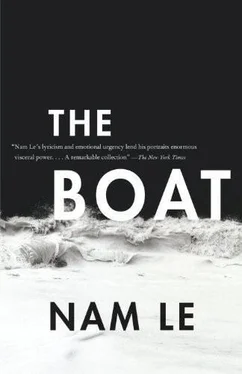"Child can spend it however Child likes but try to keep, nha ?"
Knowing her mother's usual frugality, Mai struggled to respond but her mother said nothing more, wiping her hands stiffly on her pajama pants and turning back into the house.
Two days later she told Mai to go visit her father at the hospital.
"Child is a good child," he told her after a long silence, his eyes fixed on some invisible locus in the air. He'd barely reacted when she came in and greeted him — it was only her second visit since he'd returned from reeducation camp. What had they done to him there? She remembered him being gaunt three months ago, when he'd first returned, but now his whole face was sunken — as though its foundation had finally disintegrated, leaving his features to their slow inward collapse. His eyes extruded from their deep-set sockets like black stones.
"How is Ba?"
"Ba is unwell," he said, rubbing his stubbled chin. He spoke to her as if to a servant. He didn't even look in her direction.
Mai hesitated. "Can Ba see?"
He didn't seem blind to her. She'd always imagined blindness to be a blacking out — but what if it wasn't? What if he could see — his eyes seemed outwardly unchanged — but had now chosen not to? What if his eyes were already looking elsewhere?
She said, "Ba will get better."
"Child is a big girl now. How old is Child now?"
"Sixteen."
"Heavens," he cried. Then jokingly, "So Child has a boyfriend, ha?"
Mai blushed and her father's hand searched for her head, patted it. Instinctively she twisted her cheek up into his rough palm. She'd come with so much to say — so much to ask — but he might as well have been deaf as blind. He laughed humorlessly. "At sixteen, Ba had to look after Ba's whole family."
Mai didn't reply. She felt insolent looking at his face when he didn't look back.
"Look after your mother," he said.
Look at me, she wanted to say. She considered moving into his fixed line of sight but didn't dare. Just once, she thought. Just look at me once, Ba, and I'll do anything you say.
"And obey her, nha?"
"Yes, Ba."
He gave a single nod, then smiled, but it was nothing more than a flexing of his lips.
"Obey your mother. Promise, nha?"
"Yes, Ba."
"Child." His voice lowered conspiratorially and, her breath quickening, Mai stooped down closer to him. He was going to talk to her. Once, that had been her whole life. He smelt like rusted pipes. "Stop it," he whispered. She held her breath, watching his eyes. They were still locked in midair. "Stop crying, Child."
She held herself still as he patted her head again.
"Good girl," he said.
The next day her mother put her on a bus to Rach Gia. It was a five-hour trip, she was told. Here was a plastic bag for motion sickness. In the market she would be picked up by an uncle she had never met. "Give this to him," her mother said, and pressed a fold of paper, torn from an exercise book, into her confused hands. Just before she got on the bus, her little brother, Loc, tugged at her shirt and asked if she minded if he used her bicycle.
"Use your own bicycle."
She boarded. Watched the two of them through the scuffed, stained window. Then, on the street, her mother raised one hand from her thigh in a hesitant motion, as though halfway hailing a cyclo.
"Ma?"
Mai pushed through the scree of indifferent bodies and rushed out to her mother. She stood there, breathing hard, sensing the larger finality in their parting. Her mother asked if she still had the money. Yes. Remember not to let anybody see it. Yes. Her mother smiled abstractedly, then brought her hand onto Mai's head and eased down, combing hair between her fingers.
"Child," she said softly, "remember, nha ? Put your hat on when Child gets off."
Mai stammered, "Child hasn't said good-bye to Ba."
Her mother's hand followed the contours of her skull down into the inlet of her neck, a single motion. "Don't worry," she said. "Ma will say. For Child."
As the bus pulled out, a residue of memory surfaced in Mai's mind. Seeing her father off the first time — seven years ago, when he left for the war — her mother had clung fast to his elbow, her body turned completely into his, her face creased as though it were having trouble holding together a coherent emotion. But the second time — five years later, at the end of the war — her face had completely smoothed itself over. It had learned how to be expressionless.
Mai looked out of the back window-searching for her mother's face-but the street, like a wound, had closed over the space where it had been.
***
AFTER HEARING HIM SING, Mai caught herself, time and time again, searching for Truong. She was most at ease sitting in the shade of the hatch door, facing the prow, watching him with the other children. The only structure on the foredeck was the pilothouse and the children played in a small clearing behind it — a concession of territory from the adults teeming all around. Many of the children were twice Truong's age. He played with them laconically, indifferently, often leaving a game halfway through when he was bored, inevitably pulling a small group along — eager for him to dictate a new game.
Unlike the others he didn't constantly look around to find his family. He lived in a space of his own absorption. Quyen, too, seemed content to let him be. Hemmed in always by dozens of other sweaty, salt-gritted bodies, Mai watched him, stealing solace, marveling at how he could be in the sun all day and remain so pale.
It seemed impossible she'd known him only a few days.
According to Quyen, Truong's father — her husband — had already made his escape. She told Mai that he had arrived safely in Pulau Bidong, one of the larger Malaysian refugee camps, eight months ago. He was waiting for them there.
Why hadn't they traveled together?
"We are going to America," Quyen continued, passing over Mai's question. "My husband has already rejected one offer from Canada. He says he has made friends in the Red Crescent."
"Red Crescent?"
"Do you have any family there?"
After a while Quyen, misreading Mai's silence, continued, "You are probably going to Australia, no? Many people are going there now."
"No. I don't know."
"You don't know?" She pursed her lips in mock decision: "Then Mai will come with us."
"Thoi," started Mai uncertainly.
"You must come. That one likes you," Quyen said, gesturing at Truong. "He talks about you all the time."
Mai flushed with pleasure, not fully understanding why — as she knew Quyen was lying. "He is very good," she said. "Very patient."
"Yes," Quyen replied. She reflected for a moment. "Like his father."
"And who has ever heard of a young boy who can sing like that? It's a miracle. He will make you rich one day."
" Thoi , don't joke."
She looked at her friend, surprised. "I am not joking."
Together they turned toward him. He stood skinny and erect, his clothes hanging from his limbs as though from a denuded tree's branches. His hands directing the ragtag crew to throw their sandals into a pile. Mai wondered briefly if it made Quyen proud — seeing all those children scrambling to obey her son. The game was one her brother used to play. Relaxing her mind, Mai could almost fool herself into thinking he was there, little Loc, springing away as the designated dragon swung around to protect his treasure hoard. He was about the same age as Truong. Her thoughts started to drift back to her last meeting with her father, at the hospital, when Quyen interrupted:
"That one was an accident."
Mai immediately blushed, said nothing.
"He slid out in the middle of the war."
How could she could joke about such a thing? Mai still remembered her father's photo on the altar those five years, the incense and prayer, the hurt daily refreshing in her mother.
Читать дальше











